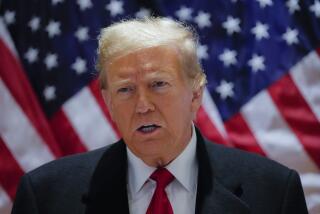Gag Placed on Foes of Apartheid : S. Africa Order Affects Cape Town Groups and Press
- Share via
JOHANNESBURG, South Africa — Police moved Saturday to silence many leading anti-apartheid groups in Cape Town by prohibiting the press from quoting any of their officials and forbidding them to publish any materials themselves.
Among 119 organizations affected by the gag order are the United Democratic Front, a coalition of anti-apartheid groups with 2 million members nationwide; the Congress of South African Trade Unions, the nation’s largest labor federation, and the black-consciousness Azanian People’s Organization and its affiliates.
Although the order applies only in the six magisterial districts in and around Cape Town, it was seen as a model for similar moves by police elsewhere in the country as the government tries both to quell continuing civil strife and to halt black demands for fundamental political, social and economic changes.
Restriction Eased
In another move, police relaxed one restriction on journalists, allowing them to enter black townships and report on any events there that do not involve unrest and that are not related to the activities of the police and army. On Monday, reporters had been completely barred from all the segregated black townships.
The government’s information bureau, the sole authorized source of news on civil unrest, reported that no one was killed in political violence during the 24 hours ending at daybreak Saturday. Only scattered incidents of unrest, mostly in black townships east of Johannesburg, were reported, according to the bureau.
This was the first day in many weeks that no unrest-related deaths were reported, and the government cited it as evidence that its tough measures are restoring law and order. Before Saturday, a total of 54 people had been reported killed since the current state of emergency was declared June 12.
Difficult to Verify
Severe restrictions on journalists make it difficult for them to verify official claims. Reporters may not cover incidents of unrest firsthand or report on the activities of the police and army, except for material provided by the government information bureau. Nor may they quote “subversive statements” by opposition leaders.
Brigadier Christoffel A. (Blackie) Swart, the regional police commander in Cape Town, invoked the broad powers given him under the 10-day-old national state of emergency to issue Saturday’s order prohibiting the 119 organizations from publishing anything and barring statements by their officers from publication in the local press.
The government information bureau at first denied that Swart had issued such an order, but it later confirmed that he had done so under the emergency regulations. A bureau spokesman declined to comment further.
To Silence Criticism
The apparent intent of the order is not only to silence much of the present criticism of the government but to further weaken organizations already hit hard by widespread detentions of political activists under the state of emergency.
Other organizations named in the banning order included the Detainees’ Parents Support Committee, which monitors political detentions and helps families of detainees; the Civil Rights League, which reports on human rights abuses; the National Union of South African Students, and the End Conscription Campaign.
Two-thirds of the organizations listed are community-based entities, such as civic and parent-teachers committees and ecumenical groups, that have been reluctantly drawn into politics during the last two years.
The police move was denounced in Parliament by Peter Gastrow of the Progressive Federal Party, a liberal white opposition group. Gastrow accused the government of trying to “bluff us” into believing that the situation is improving. The new curbs, if they work, will only give whites “a false sense of relative stability” while tensions continue to build in the black community, Gastrow said.
Could Affect Tutu
Swart’s order is so broad that police may find it difficult to enforce. As founding patrons of the United Democratic Front, for example, Bishop Desmond Tutu and the Rev. Allen Boesak, two of the country’s most prominent churchmen and anti-apartheid activists, might find themselves silenced in their own communities, even on nonpolitical subjects.
Read literally, the order would prohibit several listed religious groups from publishing parish news letters, and newspapers from other cities could be barred from sale in the Cape Town area if they quoted any of the listed organizations. Even state-run radio and television might contravene the law in this way.
Swart had previously tried to ban any public display--whether on bumper stickers or T-shirts or badges--of political opinion but was overruled by the minister of law and order.
More to Read
Sign up for Essential California
The most important California stories and recommendations in your inbox every morning.
You may occasionally receive promotional content from the Los Angeles Times.













